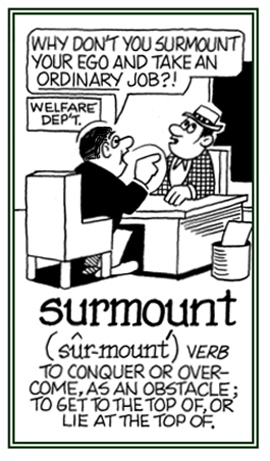super-, supra-, sur-
(Latin: above, over; more than, excessive)
Sur- is a variation of super- developed through the French and shouldn't be confused with another assimilated sur- form that comes from sub- and means: "under, below, beneath".
In some words, super- is amplified to mean: "on top of; higher in rank or position than; superior to; greater in quality, amount, or degree than others of its kind".
2. A short sleeveless garment worn as part of the ceremonial costume of an order of knighthood.
3. A loose outer coat or gown.
2. The outer face, outside, or exterior boundary of something: Sam's dishes have shiny surfaces.
3. Any face of a body or thing: There are six surfaces on a cube.
The surface of the wooden box is rough.
Joe was warned to be careful of the icy surfaces on the streets.
4. Etymology: from Latin I>sur, "above" + face-, "face".2. Pertaining to being superficial or external: Joan had a surface expression on her face when she was told that she could not go to the movie.
3. Going by land or water and not by air or underground: The postman delivered the surface mail as expected.
The city had the best surface transits in the country.
2. To rise to the top: The submarine surfaced to the top of the water in the harbor.
The dolphins were surfacing and diving back into the water over and over again.
3. To appear or to become obvious after being out of sight: After some years, the actor surfaced in a very funny comedy.2. A form of machine for dressing the surface of wood, metal, stone, etc.
2. Overindulgence, or a bout of overindulgence, in something, especially food or drink.
3. Disgust or revulsion resulting from overindulgence.
4. Etymology: from Old French surfet, "excess"; noun use of surfaire "to overdo"; from sur-, "over" + faire, "to do"; from Latin facere, "to make".
The issue of immigrants, who are trying to leave their various geographical areas and are surfeiting into European countries in hopes of refuge, has become a serious problem!
2. Etymology: from Old French surfet, "excess"; from Latin surfaire "to overdo"; from sur-, "over" + faire, "to do" which is from Latin facere, "to make".The sense of "eat or drink to excess, overfeed", is first recorded in Middle English in 1422.
The figurative sense of "fill or supply to excess" is first recorded in 1592.


Go to this Word A Day Revisited Index
so you can see more of Mickey Bach's cartoons.
2. An idea or opinion based on inadequate and unconvincing proof; a conjecture: When Nicole came home after the staff meeting, there wasn’t any dinner left for her; so, she surmised that it had tasted so good that her family could not stop eating all of it!
3. An idea or thought of something as being possible or likely: Jane surmised that the good-looking man must be a prominent person because everybody in front of the theater was asking him for his autograph!


Go to this Word A Day Revisited Index
so you can see more of Mickey Bach's cartoons.
3. Anyone who has an idea or opinion based on insufficiently conclusive evidence; a person who makes conjectures or who simply guesses.
2. To ascend to the top of; to climb; to get over the top of a physical obstacle: It was the first time for Lynn to go hiking in the Alps, but she was able to surmount and master the strain, hindrances, and hazards that accompanied the task of reaching the top of the peak.
3. To place something above; to put on top; that is, to be above or on top of: The mountain of Marburg is surmounted by the Marburger Schloss, which is a very old castle, built in the 11th century.
4. To surpass or to exceed in an amount or quantity: Mark loved reading and the quantity of books that he bought during the year surmounted the number he had obtained the year before; however, he read all of them!


Go to this Word A Day Revisited Index
so you can see more of Mickey Bach's cartoons.
2. Possible to climb to the top: Jack and Jill decided that the mountain in their area was surmountable, and so they started their hike the following day!
2. Anyone who ascends, or climbs, to the top of an obstacle.
2. That name which identifies someone as belonging to a particular family and that he or she has in common with other members of that family.
3. A nickname or epithet added to a person's name.
Related "above, over, beyond the normal, excessive" word units: epi-; hyper-; ultra-, ult-.
Inter-related cross references, directly or indirectly, involving word units meaning "more, plentiful, fullness, excessive, over flowing": copi-; exuber-; hyper-; multi-; opulen-; ple-; pleio-; plethor-; poly-; total-; ultra-; undu-.


